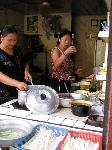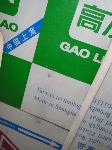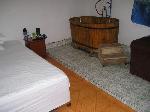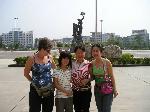- Getting around Lijiang. Dont stay in the Old Towns more than 2 days, there is nothing to do. KRISS Oct 9, 2013 05:46
- 2013 Beijing Temple Fair BENNYLAU Feb 26, 2013 03:29
- Malaysian traveling from KUL - LAX vis Shanghai PVG ZATI_DY Jan 3, 2013 20:15
Ripples of the Revolution
- Views: 3155
- |Vote: 0 0
- |Add to Favorites
- |Recommend to Friends
Her mother stood on the docks at Chiaotian Men – tears in her eyes – waving goodbye. She was not the only mother that day to farewell her children. They were being shipped out of Chongqing City en route for the remote southeast corner of what was then Sichuan Province, as part of Mao’s massive mobilization and re-education of the population programme. The child wept too, not knowing it would be three years before she would see her beloved family again: she was just sixteen.
Her destination was a remote village in the mountains, a day’s walk from the nearest town of any size, Xiushan. With two other girls of a similar age she spent ‘the worst’ and ‘the best’ three years of her life, learning to farm and to survive in the harsh conditions of the mountains. Once they pooled their resources to buy a piglet. Returning to their mountain home with the piglet secure in a woven bamboo basket on her back, she felt the wet warmth of the piglet’s pee soak through her shirt – her only set of clothes. The plan was to fatten it for eating some time in the future – so with this prospect in mind she would tolerate the now unpleasant odour of her clothes.
This is one of many first hand stories friends and acquaintances have related of their experiences during the ‘Cultural Revolution’. I was interested to see where my friend had spent this interesting period of her life. The opportunity arose this past summer as Xiushan fell on our proposed route. Our journey there began from the southeast – the opposite direction – from a place called Jishou in western Hunan Province. We arrived in Jishou after lunch making our way to the small long-distance bus station only to find the last bus to Xiushan would not depart until around four o’clock or when full as is customary with many smaller locations.
We bought our tickets, a late lunch in a seedy diner next to the station, a supply of iced water and settled down to wait. It was hot but the waiting room was surprisingly cool. Finally we boarded the bus and after a couple of false starts and some heckling from many of the other passengers we pulled out of the station. The forward movement of the bus was the only source of air-conditioning so it was a great relief to feel the breeze and finally be on our way.
The road north out of Jishou was rough, narrow and windy. We had not gone far when we stopped again – this time for fuel and water. The ceiling of the bus was lined with what appeared to be packaging material and on the roof of the bus was a large flat water tank which we assumed fed the radiator on this long journey over the mountains. Finally on the way again the road entered a wide flat valley with steep precipitous peaks on either side. Small villages dotted the valley floor and a river flowed lazily along. We stopped one last time in the small village for watermelon which the driver and the boss’s son shared with us – our young companions sitting up front had made new friends – before we began our ascent on the far side of the valley.
From the valley floor opposite we could see traffic moving up the steep switchbacks to the top of the mountain before disappearing through the pass. Each hairpin we took brought a shower of water from the roof-top tank through our open windows if we failed to close them in time. Beyond the pass the terrain became rolling hills of farmlands and forests, with small white quarts quarries at regular intervals mostly on blind corners along the road. In the larger dusty towns, trucks and machinery clogged the main road that afternoon – and perhaps every afternoon – bringing traffic to a standstill. While it was interesting to watch the passing parade from our window the air was uncomfortably thick with dust, smoke and fumes.
Sitting across the aisle from us was a very short, very stocky and in no way handsome man, his wife and their young child, who despite the heat was quiet and well behaved. Her father’s curiosity, manners and behaviour were all mildly unsettling for us. Perspiring profusely, his shirt removed, unable to reach the floor with his feet, he spent most of the journey perched on the edge of his aisle seat, smoking and spitting with regularity and unashamedly staring at my friend and me. And there was no escape for us until we reached their destination.
Before dark we made our last scheduled stop at another high pass, refilling the water tank, washing the bus and for those game to use the amenities, a toilet stop. As night fell we approached the border. After crossing a bridge over a narrow gorge a large sign across the road heralded our arrival in a small village in Chongqing Municipality. Shortly after, our bus was stopped by police for a brief inspection, before continuing. We never did find out what, if anything they were looking for. In the deepening darkness all that could be seen in the headlights were the white painted trunks of the trees lining the windy road and the occasional lights from farmhouses and villages as we passed through. In one village everyone seemed to be outdoors enjoying the cooler evening temperatures. They were without electricity and dined or played cards and mahjong by candle light.
Hospitality in China is a wonderful thing. One of our students also lives in Xiushan and we could not pass through without visiting them. In fact when they heard we were coming they offered to host us all in their home. This is a relatively poor region of China so – as we approached Xiushan – all of us began to wonder how this generous family could possibly host all four of us in their family home.
Hot, tired and grimy from our days travel we were met by our student, her cousin and parents and bundled into two taxis for the short ride to their ‘home’. We were let out in the street and followed her father down a narrow side street, to an alley next to a bar, across the courtyard and into the reception area of what could have been a small guesthouse. So this was how they could host so many guests – but this was no guesthouse.
Up three flights of stairs we followed him to the family’s home. They lived on the third floor in modest but recently decorated quarters. In desperate need of a shower we opted for freshening up before going out for dinner and were shown to our ‘rooms’ on the same floor. These were large and air-conditioned: each contained a larger than normal single bed, a bedside table, a massage bench and a wonderful old fashioned wooden bath tub complete with a hand held shower. We had the luxury of a room each. Our host enthusiastically showed us how to use the shower in my room and was genuinely unfazed when water began to seep from the floor of the tub – timbers now dry and shrunken from lack of use. It was no problem – the trademark comment of all Chinese when things do not go so well.
Left alone to take a shower, I stepped gingerly onto the floor of the old tub with one foot. As my weight transferred to it the timbers creaked and the floor of the tub gave way beneath me with a loud crash. I needed a shower and as my host had just proclaimed – no problem – I let my soapy water drain all over the tiled floor. Someone, I’m sure would mop it for me later.
Out in the street the air was still warm. We wandered a couple of blocks down the street to some makeshift outdoor eateries where our host appeared to be well known. A simple meal including jiaozi and baby baked potatoes was quickly on our table. We didn’t linger long over our meal but on the way back we stopped to watch a lady making ice-cream or rather frozen fruit juice. There were no milk products. Fruit of your choice is juiced and poured into a dish similar to a wok where it is spread thin and chilled. The thin film of frozen juice is worked skilfully with a wooden spatula for some minutes before being served in a cup. It was a delicious icy dessert on a warm evening.
It was only as we wandered back that the nature of our hosts business was openly revealed – we had taken a pretty educated guess ourselves and come up with the same answer. Foot washing, reflexology style massage is very popular throughout the country but I wonder what Mao would have made of the extras offered in enterprises like this one. At one time this was outlawed and even married couples saw each other only once a week and more likely much less often. Any public display of affection or intimacy was shunned. Here is another sure sign of changes in the land. I’ve even heard it said that if you can’t find a bed for the night in a hotel or guesthouse you could certainly find a couch in a massage joint. Before going back to our rooms we met a couple of the very pretty girls who work for our host. Business seemed quiet for a Saturday night but that may have been due to our presence: we’ll never know.
In the morning we discovered that our young companions shared a room that night. Had they felt a little uncomfortable too? After breakfast on the street with the family, we took a quick tour of town before taking our leave. In the morning light Xiushan resembled a war zone. It was a strange blend of old traditional and often dilapidated buildings ready for demolition along side of newer ones. All over town the scene was like that – an eerie mix of old and new – A rural town with a city overlaid. Farmers with the fresh produce were everywhere, two baskets on their shoulder poles vying to make a little cash on the streets. And right in the centre of town is a new and expansive square.
While we didn’t have the time to visit the mountain village where my friend had spent her ‘revolution’ years we did see how remote and impoverished the area still is today. My friend encourages city children to give to those less fortunate than they are. A group of them travelled down here earlier in the summer to deliver clothes and school materials for the village children and experience the way they live.
Some positive effects of the Cultural Revolution continue to send out ripples in this huge sea of humanity.







 Copyright © 1998-2026 All rights reserved.
Copyright © 1998-2026 All rights reserved.